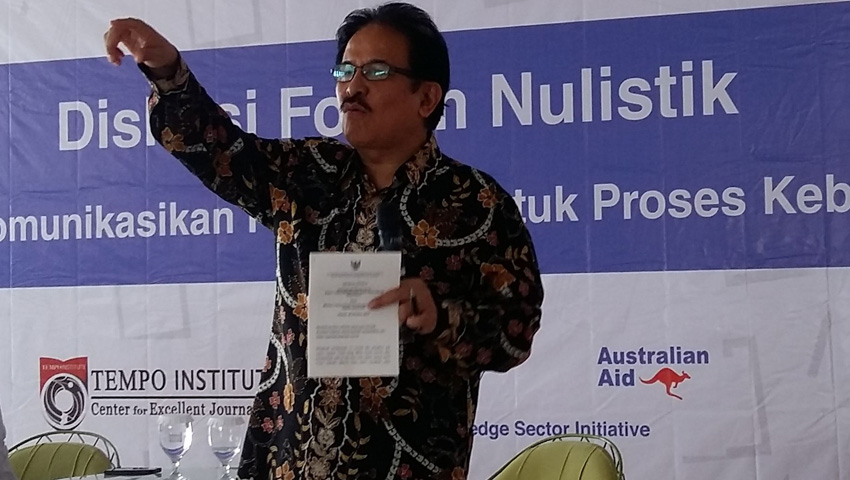Policy brief as one form of publications that is specifically aimed at providing policy recommendations is instrumental in the cycle of or policy-making process. Policy brief has a strategic significance because if it is successful in capturing the interest of decision makers through this document, it is most likely that the research results will enter policy-making debate.
"Up until now as a researcher I am quite satisfied when I have completed a research. I did not guard the research until it becomes a concrete policy, while the process which usually ends with the formulation of recommendations shows that it is as important as the research process itself, "said Maulana Dirga, researcher at the Centre for the Study of Islam and Society at the Islamic University of UIN Syarif Hidayatullah (PPIM UIN).
Dirga made the statement after attending Nulistik forum discussion entitled "Not Just Data – Research Speaks for National Policy" organized by the TEMPO Institute together with Knowledge Sector Initiative and the support of the Australian Government, in Jakarta on October 20, 2015. Presence as a resource person was Jaleswari Pramodhawardani, an expert staff of the State Secretary and Minister of National Development Planning/Head of Bappenas Sofyan Djalil as a keynote speaker. The discussion, which was attended by members of the Nulistik forum and TEMPO networking, took place in a dynamic way.
Jaleswari Pramodhawardani or Dani, as she is usually called, shared her experience of transforming from a researcher at the Indonesian Institute of Sciences (LIPI) to become an expert staff of the State Secretary, a new task with a different perspective from the eyes of researchers and the bureaucratic machine, especially in the policy process. Researchers play a big role in policy making through the provision of research results which are packaged in a creative way, short, concise, containing evidence-based, objective and comprehensive recommendations. Researchers should be able to summarize their research results into a 2-4 page readable and useful policy brief to catch the attention of stakeholders.
Nur Aziza Febriyanti, researcher at the Regional Autonomy Watch (KPPOD) said "there are many opportunities that can be used in optimum to guard the policy process ranging from discussions with stakeholders to attempt to form public opinion against the policy brief to writing in the media and the organization of a public discussion. "Research in KPPOD begins with a discussion group to map the crux of the problem, followed by comprehensive research whose results are delivered to stakeholders.
Meanwhile Minister Sofyan Djalil stressed the importance of the researchers to look deeper into the problem, not just look at the peak of "iceberg". Researchers and policy makers must be able to connect variables in the problems so that the decisions made are based on the field evidence. "A country will progress because it has a good policy. And a good policy should be based on in-depth research,” said Djalil.
Nulistik forum is an online forum that was formed last year after KSI communication workshop. The Forum is facilitated by fellow from TEMPO Institute to improve the skills of researchers in packaging the research results as well as a place to establish a network. Forum participants are not limited to representatives of 16 KSI partners, but also members of TEMPO networking consisting of representatives of the media, private sector, and government. Nulistik forum face-to-face discussion is held every two months, with the themes related to scientific materials for journalistic writing and knowledge for policy.






